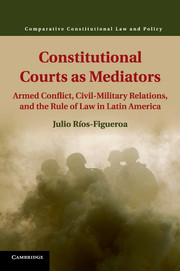 Constitutional Courts as Mediators
Constitutional Courts as Mediators Book contents
- Frontmatter
- Dedication
- Contents
- List of Figures
- List of Tables
- Acknowledgments
- 1 Constitutional Courts and the Armed Forces
- 2 A Theory of Constitutional Courts as Mediators
- 3 Constitutional Jurisprudence on Military Autonomy in Colombia, 1958–2013
- 4 Constitutional Jurisprudence on Military Autonomy in Peru, 1979–2013
- 5 Constitutional Jurisprudence on Military Autonomy in Mexico, 1917–2013
- 6 Judicial Regulation of the Use of Force in Colombia, Peru, and Mexico
- 7 Constitutional Courts as Mediators beyond Latin America
- 8 Constitutional Courts and Democratic Confl ict Solving
- References
- Index
3 - Constitutional Jurisprudence on Military Autonomy in Colombia, 1958–2013
Published online by Cambridge University Press: 05 May 2016
- Frontmatter
- Dedication
- Contents
- List of Figures
- List of Tables
- Acknowledgments
- 1 Constitutional Courts and the Armed Forces
- 2 A Theory of Constitutional Courts as Mediators
- 3 Constitutional Jurisprudence on Military Autonomy in Colombia, 1958–2013
- 4 Constitutional Jurisprudence on Military Autonomy in Peru, 1979–2013
- 5 Constitutional Jurisprudence on Military Autonomy in Mexico, 1917–2013
- 6 Judicial Regulation of the Use of Force in Colombia, Peru, and Mexico
- 7 Constitutional Courts as Mediators beyond Latin America
- 8 Constitutional Courts and Democratic Confl ict Solving
- References
- Index
Summary
A nosotros nos importan un carajo la constitución y las leyes porque estamos fuera de ellas.
(We don't give a shit about the constitution or the laws because we are outside of them.)
Jorge Briceño, El Mono Jojoy, former leader of the FARCThis chapter analyzes constitutional jurisprudence on military autonomy in two recent periods of Colombian history: the first starting in 1958, the year when the brief military government of General Rojas Pinilla ended and civilians resumed power thanks to the pact known as the National Front, until 1990; and the second from 1991, the year when the current constitution was enacted, until 2013. Specifically, I analyze quantitatively and qualitatively the decisions made by the supreme court during the first period, and those made by the constitutional court in the second, in two types of cases: cases that reach the constitutional organ challenging a previous decision made by a military authority (e.g., a military court, prosecutor, officer, or military administrative agency) and cases that reach the constitutional organ on the scope of military jurisdiction.
Taking advantage of the fact that the constitutional court enjoys higher levels of independence, access, and powers of judicial review than the supreme court, I assess whether the constitutional court's jurisprudence is closer to the ideal of third-party mediator in conflict resolution than the supreme court's jurisprudence. To quickly preview the conclusion of the chapter, the answer is a clear “yes.” In what follows, I first provide an overview of constitutional jurisprudence on military autonomy in the whole period analyzed in the chapter. Then, I analyze in detail each of the two subperiods, focusing on the political context and civilian-military relations, the characteristics of the constitutional organ during the period, and its jurisprudence on military autonomy.
Long-Term Jurisprudential Patterns on Military Autonomy in Colombia, 1958–2013
The Colombian Constitution of 1886 was in force for more than a hundred years, until 1991, when it was replaced by the current constitution. During this long period the country enjoyed a limited but stable democracy that mostly revolved, in political terms, around two parties: the Conservatives and the Liberals (Bejarano and Pizarro 2005). With the exception of a brief military government from 1954 to 1958, Colombia has not suffered military coups or intervention, but this does not mean that the armed forces are a marginal actor.
- Type
- Chapter
- Information
- Constitutional Courts as MediatorsArmed Conflict, Civil-Military Relations, and the Rule of Law in Latin America, pp. 46 - 81Publisher: Cambridge University PressPrint publication year: 2016
- 2
- Cited by
